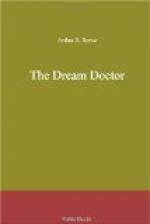At the head of these three steps was a great steel and iron door with heavy bolts and a combination lock of a character ordinarily found only on a safe in a banking institution.
The door was opened, and we descended the steps, going a little farther in the same direction away from the side of the house. Then we turned at a right angle facing toward the back of the house but well to one side of it. It must have been, I figured out later, underneath the open courtyard. A few steps farther brought us to a fair-sized, vaulted room.
V
THE PHANTOM CIRCUIT
Brixton had evidently been waiting impatiently for our arrival. “Mr. Kennedy?” he inquired, adding quickly without waiting for an answer: “I am glad to see you. I suppose you have noticed the precautions we are taking against intruders? Yet it seems to be all of no avail. I can not be alone even here. If a telephone message comes to me over my private wire, if I talk with my own office in the city, it seems that it is known. I don’t know what to make of it. It is terrible. I don’t know what to expect next.”
Brixton had been standing beside a huge mahogany desk as we entered. I had seen him before at a distance as a somewhat pompous speaker at banquets and the cynosure of the financial district. But there was something different about his looks now. He seemed to have aged, to have grown yellower. Even the whites of his eyes were yellow.
I thought at first that perhaps it might be the effect of the light in the centre of the room, a huge affair set in the ceiling in a sort of inverted hemisphere of glass, concealing and softening the rays of a powerful incandescent bulb which it enclosed. It was not the light that gave him the altered appearance, as I concluded from catching a casual confirmatory glance of perplexity from Kennedy himself.
“My personal physician says I am suffering from jaundice,” explained Brixton. Rather than seeming to be offended at our notice of his condition he seemed to take it as a good evidence of Kennedy’s keenness that he had at once hit on one of the things that were weighing on Brixton’s own mind. “I feel pretty badly, too. Curse it,” he added bitterly, “coming at a time when it is absolutely necessary that I should have all my strength to carry through a negotiation that is only a beginning, important not so much for myself as for the whole world. It is one of the first times New York bankers have had a chance to engage in big dealings in that part of the world. I suppose Yvonne has shown you one of the letters I am receiving?”
He rustled a sheaf of them which he drew from a drawer of his desk, and continued, not waiting for Kennedy even to nod:
“Here are a dozen or more of them. I get one or two every day, either here or at my town house or at the office.”
Kennedy had moved forward to see them.




